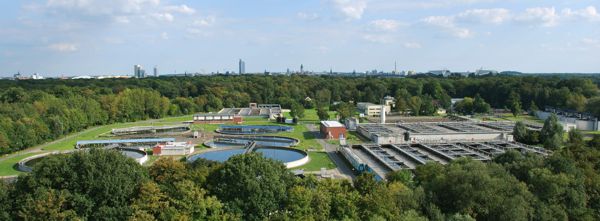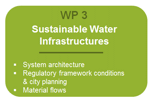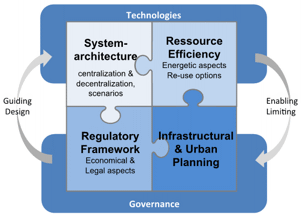
WP 3: Sustainable Water Infrastructures

Urban water and wastewater infrastructure systems are an integral component of sustainable urban development. Historically, urban water and wastewater systems were designed under the premise of stable conditions and high degrees of centralization. In the future, water infrastructure will need to be able to respond to dynamic conditions of climate change, and population growth and shrinkage.
Newly established requirements for surface- and groundwater management require new approaches. Moreover, the existing water infrastructure in many urban areas is aged and often in need of maintenance, expansion, or replacement in order for populations to have continued access to adequate water supply and sanitation services. Thus, it is time for a paradigm change and for a basic revision of our urban water infrastructure.
Our efforts need to focus on a smart combination of centralized and decentralized infrastructure components which should be well-coordinated with urban development and capable of adapting to future challenges and changing conditions.
 Conceptual frameworks and research objectives of WP 3.
The aim of this WP is to develop future water infrastructure scenarios that are sustainable from technological, social, environmental, and economic standpoints. Above, we analyze the institutional framework with a view to identifying organizational, legal and economic pathways to more sustainable urban water systems. The work package has been divided into four sub-work packages:
Conceptual frameworks and research objectives of WP 3.
The aim of this WP is to develop future water infrastructure scenarios that are sustainable from technological, social, environmental, and economic standpoints. Above, we analyze the institutional framework with a view to identifying organizational, legal and economic pathways to more sustainable urban water systems. The work package has been divided into four sub-work packages:
- Sustainable System Architecture: This sub-work package aims at developing adequate system solutions/structures for a typology of urban development scenarios and it´s relation to the rural environment.
- Material Flows – Resource efficient and resilient technologies: This sub-work package aims at identifying sustainable wastewater treatment technologies which are capable of turning waste into energy or other resources. The removal of micropollutants from urban waste streams and re-use options are also a component of this sub-work package.
- Regulatory and organizational settings: This sub-work package aims at identifying important sustainability and transformation barriers in existing regulatory and financial frameworks. In cooperation with partners from practice suggestions & blueprints for more strategic regulatory and economic approaches will be developed.
- Water infrastructure and urban planning: This sub-work package analyses why urban water infrastructure is often poorly coordinated with urban spatial development. The aim of this sub-work package is to develop institutional approaches which enable a better integration of infrastructure and urban planning.
Contact
|
Prof. Dr. Roland Müller Dept. Environmental and Biotechnology Centre UFZ Leipzig roland.mueller@ufz.de |
Dr. Moritz Reese Dept. of Environmental and Planning Law UFZ Leipzig moritz.reese@ufz.de |
